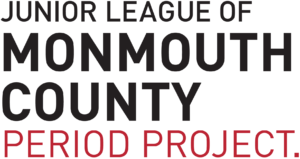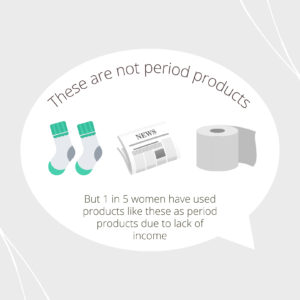Period Project
For 1 in 5 low-income women, her monthly period means missing work, school, and outings because of a lack of period supplies.

Period Poverty is the inability to access or afford menstrual hygiene products. Since March 2021, the Junior League of Monmouth County has been working to raise awareness of period poverty and supports the development and expansion of period supply programs throughout our community.
On average, a person spends about $200 per year on period supplies. For households with multiple menstruating people, this expense can overwhelm the budget.
Menstrual products aren’t covered by government assistance programs like WIC or SNAP. People without adequate supplies miss out on school, work, and activities. As an organization of trained volunteers, JLMC is prepared to provide essential supplies and work to solve this issue in our community.

PERIOD POVERTY FACTS
-
1 in 4
NJ Girls Has Missed School
due to the Lack of Period Protection -
1 in 5
Low-Income Women Reports Missing Work
or Similar Commitments due to a Lack of Access to Period Supplies
- 1 in 4 women struggled to purchase period products within the last year due to insufficient income
- 1 in 5 low-income women report missing work, school, or similar events due to lack of access to period supplies
- 88% of women agree period products are a basic necessity
- Lack of access to period supplies is linked to using substitute products, stretching product usage, and missing important events
- Only 4% of women are aware of local resources where free or reduced cost period supplies are available
- Federal and State safety net programs cannot be used for period supplies
*Source: 2018 U by Kotex survey conducted with YouGov

New Jersey was a leader in the fight against period poverty and was one of the first states to list menstrual products on the sales tax-exempt list.
The CARES Act has reclassified menstrual hygiene products to be treated as any other spending on “medical care.” That means tampons, pads, liners, and cups purchased after December 31, 2019, are FSA and HSA eligible.

In the Media
The Journal
The Junior League of Monmouth County Launches Period Product Pantry
Jan 4, 2022
The Two River Times
Junior League Says: Let’s Talk About Periods
Dec 7, 2021
Asbury Park Press
‘Period poverty’ spotlighted as Junior League sets up Period Product Pantries at Shore
Nov 19, 2021
